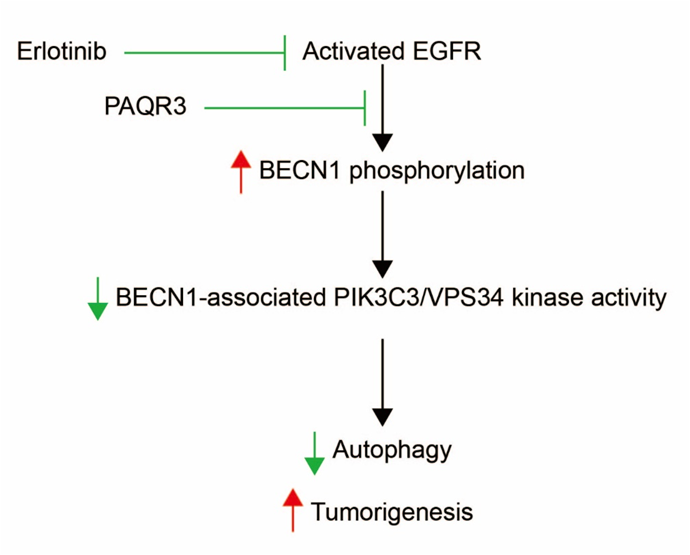Researchers Reveal a New Mechanism of Regulating Growth of Lung Cancer Cells by Autophagy
Autophagy is a critical mechanism to maintain cellular homeostasis that allows cells to survive in times of nutrient deprivation via self-digestion of proteins and organelles. Loss-of-function mutations of autophagy-related genes results in spontaneous tumorigenesis. Thus, dysregulation of autophagy has been considered as an important mechanism involved in the development of different cancers.
Lung cancer is the leading cause of cancer death in the world. Non-small cell lung cancer (NSCLC) is the most common type of lung cancer and accounts for 80% of all lung cancers. Most NSCLC harbors specific activating mutations in the tyrosine kinase domain of epidermal growth factor receptor (EGFR). In NSCLC cells, active EGFR suppresses autophagy through tyrosine phosphorylation of autophagy-related genes 6 (BECN1). Tyrosine kinase inhibitors such as erlotinib or gefitinib can inhibit EGFR kinase activity and induce autophagy.
CAO Qianqian, a PhD student at Dr. CHEN Yan’s research group in Shanghai Institute of Nutrition and Health of Chinese Academy of Sciences, recently found that progesterone and adiponectin receptor 3 (PAQR3) plays an important role in regulating autophagy and proliferation of NSCLC cells. PAQR3, as a tumor suppressor, is reduced in many human cancers. In this study, the researchers found that PAQR3 inhibits the growth of NSCLC cells both at the cell and animal levels. Meanwhile, PAQR3, as an important autophagy regulator, was found to promote erlotinib-induced autophagy in NSCLC cells. Further mechanism exploration revealed that inhibition of autophagy could completely block the inhibitory effect of PAQR3 on the proliferation of NSCLC cell, suggesting that autophagy is a key step mediating the anti-tumor effect of PAQR3.
This study reveals for the first time that the tumor suppressive activity of PAQR3 in NSCLC is dependent on autophagy. In clinical practice, erlotinib or gefitinib can be used for the treatment of NSCLC. Considering such important and multi-faceted activities of PAQR3 in NSCLC, altering the function PAQR3 can be explored as a strategy to enhance the anti-tumor activity of erlotinib or gefitinib in NSCLC cells.
This work was published on Autophagy on Aug 30th, 2019 with the title "PAQR3 suppresses the growth of non-small cell lung cancer cells via modulation of EGFR-mediated autophagy". The research was supported by the National Natural Science Foundation of China, the Ministry of Science and Technology, and the Chinese Academy of Sciences.

PAQR3 regulates tumorigenesis via modulating BECL1 phosphorylation and autophagy (Image by Dr. CHEN Yan's Lab)
Media Contact:
WANG Jin (Ms.)
Shanghai Institute of Nutrition and Health,
Chinese Academy of Sciences
Email: sibssc@sibs.ac.cn
